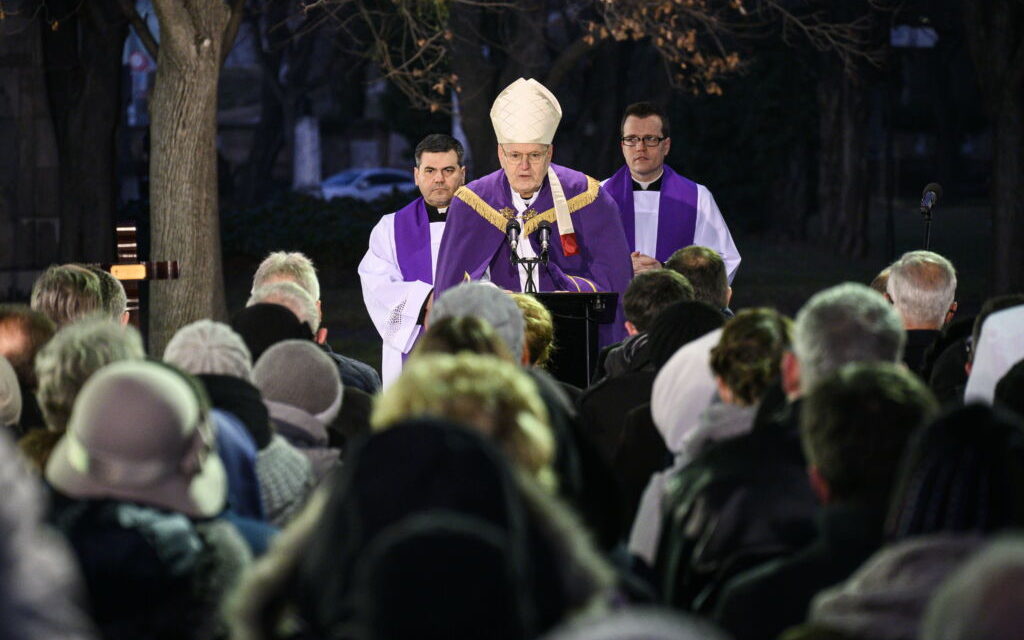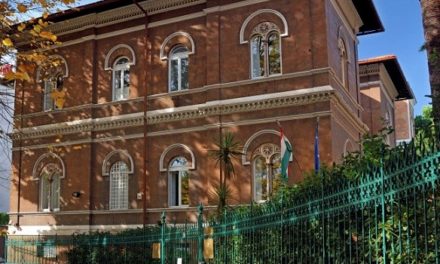The nun Margit Slachta, who died in American emigration in 1974, and the first female representative of the Hungarian Parliament, was reburied on Tuesday in Budapest, in the Fiumei út cemetery.
Cardinal Péter Erdő, archbishop of Esztergom-Budapest, who led the ceremony, said: Margit Slachta "knew and wanted to represent the ideal of Christian love in a public, practical way, in word and deed". During the war, he thoughtfully and organizedly supported the poor and saved the persecuted, but he also saw the inhumanity of the new autocracy that began after the war, and he dared to speak out against it in the parliament, he said.
He added: for Margit Slachta, helping love was not just heroic work, but "personal touch and devotion", "kindness and attention" towards another person.
The cardinal emphasized: in the life of Margit Slachta, there were flashes of light that only accompany the path of true saints. He was perhaps the very first to notice the program of planned genocide among the atrocities of the beginning of the war. Already in the summer of 1941, he realized the terrible reality that the Jews deported from Hungary at Kőrösmező had become victims of genocide at Kamenyec-Podolský. He saw the workings of evil in the world, the deep trap "that humanity was about to fall into through the weakness and sin of many," said Péter Erdő.
In his speech, Deputy Prime Minister Zsolt Semjén emphasized that it is the responsibility of the current Hungarian state and government to organize the return of the ashes of Hungarians who have been in foreign lands for various reasons and ages.
"This is duty, main drive and satisfaction," he stated.
Speaking about Margit Slachta, she emphasized that her name is associated with the recognition and protection of women's dignity, and the formulation of the demands of Christian feminism, which differs from the radical feminist ideology in its worldview. He advocated the expansion of human rights, but he did not tear the special value and interest of women out of the order of nature, the family, or society, he said.
Zsolt Semjén recalled Margit Slachta as an example of the nun's advocacy charisma, after learning about the deportation of Slovakian Jews, she traveled to Rome and was able to receive her in XII. Pope Piusz, who, upon hearing from him, ordered the Slovak bishops to protest about the threat to Slovakian Jewry.
Zsolt Semjén added that in the post-war period, in 1947-48, he and István Barankovics, the president of the Democratic People's Party, spoke out against the bill nationalizing church schools and fought despite all attempts at communist intimidation.
Magdolna Kővári, the general superior of the Society of Social Brothers, spoke about: Margit Slachta is primarily the founder of their order for the social brothers.
He is the embodiment of the divine gift and charisma that brought the ancient monastic ideal "from the wilderness to the center of life" so that the monks can "use modern means" to stand up for the interests of the church, the family, women and children. Not only by wiping tears and healing wounds, but also by trying to eliminate their causes, he said.
Margit Slachta "was able to observe, see and show the events of life and history from God's point of view." "He was undeterred, because he believed in God's final victory," said the head of the order, adding that Margit Slachta's "thoughts and teachings are still alive today and appeal, call and oblige."
Márta Mátrai, the Fidesz housekeeper of the Parliament, put it this way: "we didn't come to say goodbye, but to say hello." To greet the returnee, who arrived among us after many decades of hiding". He recalled: Margit Slachta decided at a young age that she would follow a new path as a monk and represent the millennia-old values of Christianity in a modern way. The teaching of Christ, in which the woman is the equal partner of the man in everything, he added.
It was just as good a service for politics as it was for charity. Serving the fulfillment of human life. And the parliament offered space and opportunity for this service, said Márta Mátrai.
Emma Németh, the head of the company in Hungary, spoke about the fact that in the last century it was not uncommon for people who loved their country very much and wanted to serve it to be forced to leave it. Among them was Margit Slachta, who was expelled from the National Assembly in 1948 due to her non-compromising stand for Christian and national values, and who left Hungary illegally, he said.
In a letter to his community, he promised to return as soon as he completed his duties overseas, and he traveled back to Vienna in November 1951, but he did not manage to cross the Hungarian-Austrian border.
What was not possible then, despite several months of trying, could now happen thanks to grateful posterity, said Emma Németh.
The ceremony was attended by László Kövér, the President of the Parliament.
On the initiative of the Barankovics Foundation, with the cooperation of the Society of Social Brothers and the Institute of National Heritage, Margit Slachta's remains were brought to Hungary on November 9.
His life journey
Margit Slachta was born in 1884 in Kassa. In 1906, he obtained a civil school teacher's certificate specializing in German and French at the Institute of the Sisters of Our Lady in Kalocsa. From 1920, she was the first female representative of the parliament, as a candidate of the Christian National Unity Party. He organized the Christian Women's Camp after the fall of the Soviet Republic and after the Second World War. In 1923, he founded the Society of Social Brothers.
He fought against the nationalization of church schools in and out of parliament. During the Rákosi dictatorship, his immunity was repeatedly suspended for shorter or longer periods of time.
He left for Austria in 1949 and then for the United States, where he died in 1974.
(MTI)
Featured image: Cardinal Péter Erdő, archbishop of Esztergom-Budapest (center) leading the ceremony, the first female representative of the Hungarian Parliament, at the reburial of the nun Margit Slachta, who died in American emigration in 1974, in the Fiumei út cemetery on December 7, 2021.
MTI/Zsolt Szigetváry












